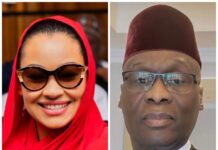The International Monetary Fund (IMF), and the European Commission for International Partnerships, have recommended ways Africa can respond to global shocks to build a more resilient Africa.
This is contained in a joint statement issued by Ms Kristalina Georgieva, the Managing Director, IMF and Ms Jutta Urpilainen, European Commissioner for International Partnerships at the Eleventh African Fiscal Forum.
The statement was obtained from the IMF website by the News Agency of Nigeria (NAN) in Abuja on Wednesday.
The statement said the Eleventh African Fiscal Forum with the theme; “Building a Resilient Africa’’ is taking place virtually from March 21 to March 22.
According to the executives, over the past three years, Sub-Saharan African countries have been faced with adverse shocks.
“These have led to a sharp deterioration in living conditions, including the COVID-19 pandemic, food and energy price increases worsened by Russia’s war in Ukraine, and climate change.
“In the face of such shocks, many countries have been compelled to turn to short-term support measures, such as tax cuts, untargeted food or fuel subsidies, and price controls on specific goods.’’
They said these measures, while necessary, have added to fiscal pressures amid growing debt vulnerabilities, which had forced governments into difficult tradeoffs.
“While such shocks do require governments to step in and protect the most vulnerable, actions to gradually reduce fiscal deficits will be crucial in most countries.
READ ALSO: Elections: We’re deeply troubled by acts of violence, voter intimidation — US govt
“This is to rebuild buffers, protect debt sustainability, and ensure macroeconomic stability.
“This Forum focuses on three ways to reconcile the need to effectively respond to shocks to rebuild fiscal space, thereby, contributing to building a more resilient Africa.’’
The executives said the first way when conditions permit, was for African countries to shift from broad-based subsidies to more targeted support to save valuable resources for financing development plans and investments.
“Social spending provides a solid foundation for inclusive growth.
“It has a significant impact on human capital development by boosting school enrollment, attendance, and learning, improving health care and outcomes, and laying the foundation for increased economic productivity.
“Well-designed and targeted social safety nets will ensure that countries’ scarce resources get to the most vulnerable, where they can do the most good.’’
They said the second way for Africa to respond to the shocks was for countries to use public money efficiently.
The executives said this would maximise its impact and build more resilience for the benefit of the whole economy.
“Transparent and reliable public financial management (PFM) systems are key and robust medium-term budgeting frameworks that will help policymakers manage competing spending priorities to best achieve their development goals.
“In addition, digitalisation, including in the delivery of social assistance, can play a critical role in improving the efficiency and robustness of the management of public money.
“Climate-focused PFM and public investment management practices can ensure that countries manage the climate adaptation and transition challenges most effectively within their available resource envelope.’’
The executives said the third way was to secure more stable financial resources and preserve debt sustainability.
“More concessional financing is needed to relax financing constraints given countries’ high levels of debt and rising borrowing costs.
They said stronger multilateral cooperation was required to address unsustainable debt situations and provide space to support the most vulnerable.
“To help unlock financing for climate resilience, Sub-Saharan African countries can develop well-defined climate strategies that quantify financing needs, promote a good business environment, and develop a pipeline of credible projects.
“Good governance and fiscal transparency reforms can also foster trust in public institutions, improve tax compliance to support more revenue mobilisation and provide an attractive environment for much-needed private financing.
“We are committed to working with sub-Saharan African countries to create an attractive policy environment and provide financing to boost investment for sustainable development.”
The statement said delegates at the forum include Ministers of Finance and Social Affairs, other government officials, and representatives from Civil Society Organisation (CSOs). (























